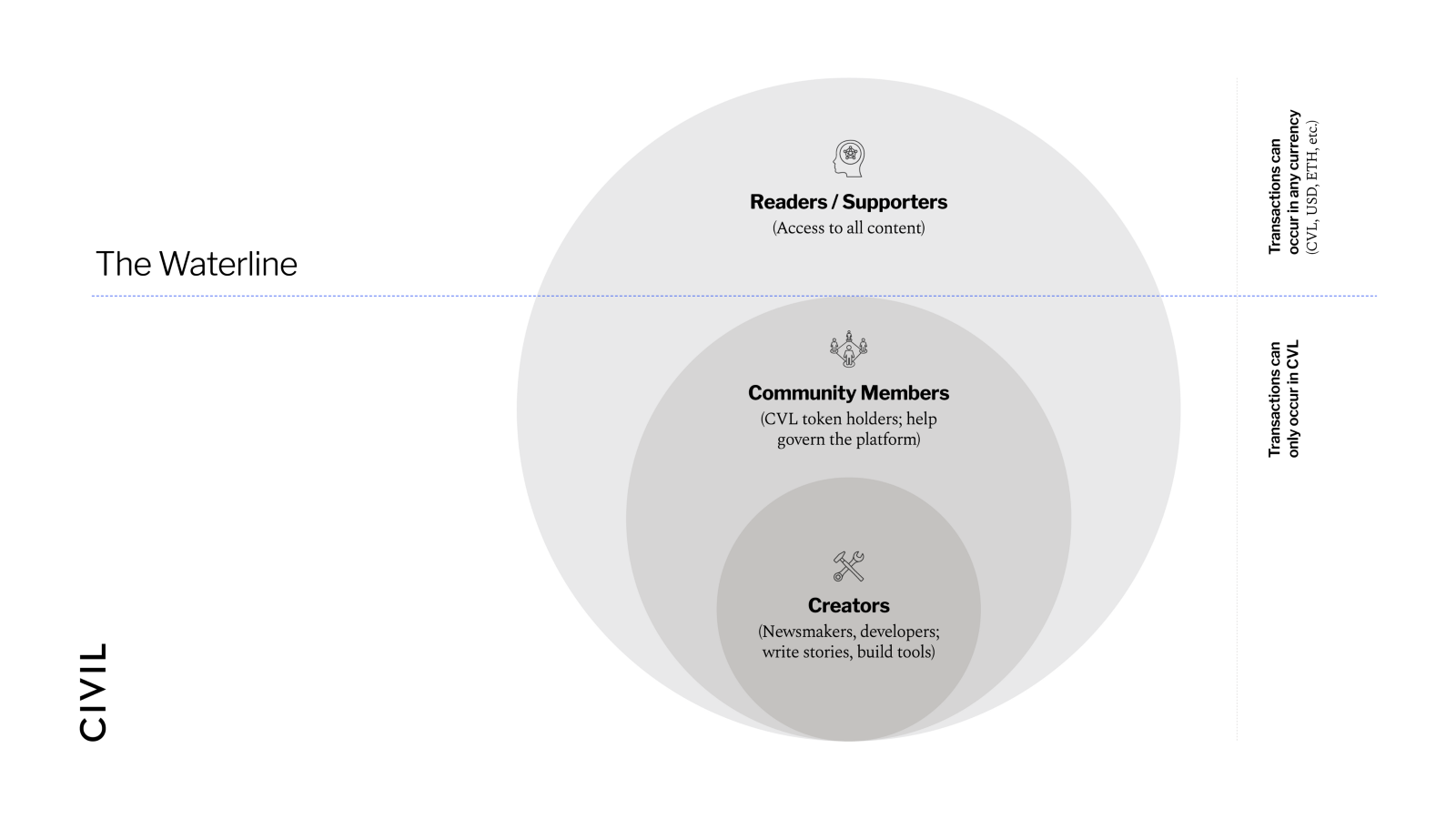Civil aims to use blockchain and “cryptoeconomics” to provide a sustainable business model for journalism. But its grand plan reminds me a bit too much of the politicking in the Star Wars prequels. Do we need a written constitution, voted on by cryptocurrency holders, to decide what’s ethical in journalism? Does freedom of the press really mean you have to sign a social contract?
To explain, I need to set the context – fairly and ethically of course. Don’t worry, I got permission from the Blocksplain Council of Elders before writing this post.
Civil’s goal is to allow newsrooms to receive sponsorship directly from users, rather than rely on advertising. So it’s a variation of the subscription model for journalism, only it uses Civil’s token – CVL – instead of fiat currency. Civil also hopes to tackle censorship and intellectual property issues using the blockchain – similar to the Po.et project, which I reviewed in a previous post.
Last week Civil got a large injection of Journalistic Credibility, when it hired veteran media executive Vivian Schiller. She’s the former President & CEO of NPR and has also been an executive at multiple top-line news companies (including CNN and NYT).
Schiller’s new job is CEO of the nonprofit arm of Civil, called the Civil Foundation. This foundation was created to separate out the journalism ethics from the business side. The latter is handled by The Civil Media Company.
In her debut post, Schiller likened joining a blockchain-based media company with starting a news website back in 1993. In particular, she thinks decentralization will be the key attribute for online news media going forward. With Civil, she says “readers will have a direct relationship with Newsrooms, which breeds trust, loyalty and funding.”
So what does Civil do exactly? The organisation’s white paper was published on Medium less than a month ago, by founder Matthew Iles. It describes Civil as “the decentralized communications protocol for journalists and citizens.”
Yes, Civil is yet another “protocol.” It seems like nearly every ICO is trying to create a new protocol. In other words, they all want to create a method for doing something on the Web that then becomes the default for everyone. Bitcoin wants to be the protocol for p2p electronic cash, Ethereum wants to be the smart contracts protocol, Ripple wants to be the protocol for international financial transactions, IOTA wants to be the IOT protocol, and so on. Civil, apparently, wants to become the protocol for blockchain journalism.
Civil’s protocol, says the white paper, “limits the need for (and influence of) third parties like advertisers and centralized publisher conglomerates.” It even goes so far as to suggest that independent publishers won’t even control what’s on their own websites:
Rather than a given platform or publisher dictating the content its readers can consume, a decentralized network of people curates newsrooms and content.
All of this will be incentivized by Civil’s Ethereum blockchain-based token, CVL.
Meanwhile, Vivian Schiller’s foundation will uphold the Civil Constitution. This will be how it’s decided “what does — and does not — constitute ethical journalism on Civil.” The foundation is also responsible for something called the Civil Council, which will settle any disputes.
It’s a complicated vision, but I do like how this diagram from the company visually explains how the CVL token will work:

Essentially, readers will be able to pay using any currency. But in order to help “govern” the Civil platform, users will need the CVL token. CVL holders “will have the ability to vote on key decisions, including whether newsrooms meet the criteria and ethics laid out in the Civil Constitution.”
My take
The token economics makes sense to me, but I worry about all this talk of constitutions and councils. It reminds me too much of the Star Wars prequels, which were nearly ruined by political mumbo-jumbo. The opening scroll of The Phantom Menace unfortunately set the tone for the three films to come:
The taxation of trade routes to outlying star systems is in dispute. … The congress of the Republic endlessly debates this alarming chain of events …
I can easily imagine the Civil community and/or the Civil Council endlessly debating a series of alarming chains of events, too.
If there’s one thing I learned building a blog business in Web 2.0, it’s that the best journalism comes out of passion for a subject and trusting your instincts on what’s worth exploring. In other words, what’s important is the individualism of the journalist/blogger and a nose for a good story.
Great journalism won’t come from a council’s edict. Indeed, I worry that the already alarming tendency of social media to pass blanket judgements on people and decree what can and can’t be said online, will only worsen under Civil. Freedom of the press doesn’t mean abiding by what some council decides is or isn’t ethical to report on.
On the plus side, I think the token model is definitely worth exploring in journalism. My day job is Chief Product Officer at an independent media company, so I know how hard it is in the current environment to create sustainable journalism. If a company like Civil or Po.et can figure out a way for readers to easily pay for journalism using tokens, then that is a business model at least worth trying.
But please, spare me this talk of councils and constitutions. I’ll decide what I will write about, thank you very much.
Lead image: Wookieepedia

